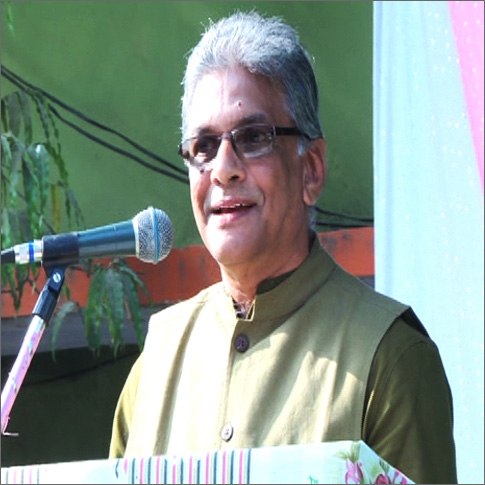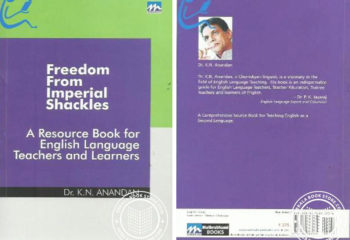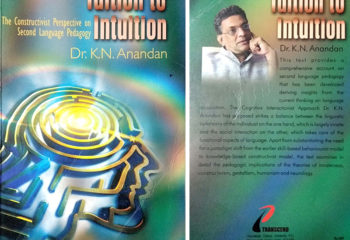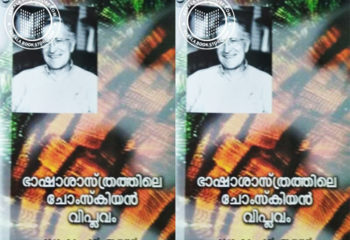
KN Anandan (born in 1949 in Tirur, India ) is an Indian Linguist, ELT specialist and social activist.
Anandan is a Chomskyan linguist who had studied at the Central Institute of English and Foreign Languages (CIEFL), Hyderabad (at present EFLU). His 1986 M.Litt dissertation, Predicate Nominal in English and Malayalam is a significant work in Malayalam syntax, which claims that the so-called adjectives in Malayalam are relative clauses with a rich internal structure. The dissertation also predicts that this observation hold good for other Dravidian languages. His PhD thesis, Constraints on the extraction from Coordinate Structures: an ECP Approach (1991) shows how Empty Category Principle, as proposed in Chomskyan Syntax can subsume apparently different phenomena such as Ross’s constraints, William’s facts ATB phenomenon, Grosu’s facts and Right Node Raising manifested by coordinate structures and parasitic gaps. His book ‘Bhashasasthrathile Chomskyan Viplavam (Chomskyan Revolution in Linguistics) written in Malayalam won him Kerala Sahithya Academy Endowment Award in 2006.
As a researcher pursuing Chomskyan studies, Anandan has always been skeptical about contemporary ELT Practices. After his studies at CIEFL, Hyderabad he started developing pedagogic models for teaching English and trying out them deriving insights from Chomsky. The first model, ACE (Acquiring Competence in English) came out in 1995. As an innovative pedagogic model ACE received a lot of media coverage in those days. He was appointed consultant of the District Primary Education Programme (DPEP) of Kerala, a flagship project meant for bringing about qualitative changes in classroom by providing activity based and experiential learning for the learners. It was then that he conceived the Second Language Acquisition Programme (SLAP) for the beginners in class 4 (as the teaching of English began from class 4 onwards in those days). In the early stages of its launching SLAP faced a lot resistance because it had rejected almost all of the ELT practices. In the place of textbooks he had introduced an evolving text book (ETB). It conceived the individual learner as the creator of the textbook. SLAP was in the field for two years. Children who were brought under the programme were able to use English with confidence.
Anandan plunged into his intensive field research on language pedagogy during 2000 to 2005. Experiences he gained led him to sharpen the classroom processes. Eventually, Discourse Oriented Pedagogy (DOP) took shape. He developed several models of my pedagogy such as RACE (Rapid Acquisition of Competence in English), a multimedia programme for teenagers, REAP (Rapid English Acquisition Programme) for children at the primary level, FACE (Facilitating Acquisition of Competence in English) for the beginners and SPACE (Special Package for Acquiring Competence in English) for the proficiency development of teachers and learners both at the primary and secondary levels.The State Council of Educational Research and Training (SCERT) of Kerala endorsed his pedagogic model and developed the new series of textbooks in English for classes 1 to 10 in a phased manner. Later, in the year 2011, DOP was adopted by APSCERT and was launched in all the schools of the state (prior to bifurcation) and is being followed in the states of Telangana and Andhra. SPACE has been launched in all the schools under Telangana Residential Educational Institutions Society (TREIS), an autonomous society under the Government of Telangana. Anandan has been continuing his interventions in ELT in the states of Gujarat (in collaboration with Gnayashala (NGO) and Pondicherry (in collaboration with Azim Premji Foundation).
DOP cuts itself away from most popular classroom ELT practices that conceives language as a baggage of language facts such as sounds, words and usages and approach language teaching in a ‘brick-laying’ model. DOP redefines academic standards in terms of various discourse genres and assumes that the production of discourses is the only and necessary means for acquiring the target language. Knowledge. Anandan advocates the use of powerful pedagogic tools such as interaction, the oral narrative, choreography and drama. In the backdrop of the multilinguality of the classrooms he proposes code-switching for giving language input to the learners, especially, for the beginners. The interaction that takes place between the teacher and the learner at various points of classroom transaction becomes an important tool in the hands of the teacher to facilitate language acquisition.
DOP has been erected on the convergent platform of the theory of innateness (Chomsky, Pinker), social constructivism (Vygotsky, Bruner), SLA theories (Krashen, Cook) the theory of multiple intelligence (Gardner), Gestalt theory (Koffka, Wertheimer ), Humanistic principles (Maslow), critical pedagogy (Freire, Giroux, Kincheloe, Phillipson) and Whole Language Philosophy (Weaver). What makes DOP distinct from other pedagogic models in the post method era is its strict adherence to the claim that language cannot exist as discrete sounds/signs, words and sentences but only as discourses. This calls for going for treating language as discourses both as the input and the output. Anandan has defined the academic standards for the states of Kerala and AP in terms of both spoken and written discourses (description, conversation, narrative, song/poem, diary,m letter, notice, announcement, poster, play, choreography, speech, debate, review, etc.) each with a set of distinctive level specific features. He believes and also demonstrates with his pedagogic models that producing discourses is the only way to acquire any language.
Anandan has written two important books on the pedagogy he had developed for second languages. The first one, ‘Tuition to Intuition” which came out in 2006 contains the theoretical underpinnings of Discourse Oriented Pedagogy . The second book ‘Freedom from Imperial Shackles’ contains the praxis of DOP.
He has published papers on second language pedagogy in the journals of RIESI, Bengaluru, The Foretell and TLLT.
Anandan has been a member of the JRM under the charimanship of Prof Ramakant Agnihotri and also one of the experts who has contributed to the conceptualization of the proposed Central University of Teacher Education (CUTE).
OTHER PUBLISHED WORKS
Dr. Anandan’s PACE (Promoting Acquisition of Competence in English), Published by Mathrubhoomi (2004-05), Kerala.
Dr. Anandan’s PACE (Promoting Acquisition of Competence in English), Published by Mathrubhoomi (2004-05), Kerala. In PACE Anandan was exploring how the second language pedagogy in the constructivist paradigm can be worked out as a reading material for the unemployed youth who would like to develop proficiency in English at lest to some extent. Like the […]
Rapid Acquisition of Competence in English (RACE)
RACE, is a multimedia material conceived for adolescent learners. It is the first model that demonstrates how a multimedia material can be developed in conformity with the constructivist paradigm. RACE deals with the story of two teenagers, Radhika and Vishnu and narrates the conflict they undergo at various points of time. The programme has four […]
Rapid English Acquisition Programme (REAP) in 2004-05 for the District Panchayat, Palakkad District, Kerala
The District Panchayat of Palakkad wanted to have a programme for developing the English language proficiency of children of classes 5 to 7 as pat of the Harishree project. Launching RACE was not possible as it required multimedia facilities in the classroom. At the same time Discourse Pedagogy used in RACE was to be retained […]
The Constructive Perspective on English Language Teaching
The Constructive Perspective on English Language Teaching, in Essential readings for Teachers of English- from Research Insights to Classroom processes, (2012), edited by A.L. Khanna and Anju S Gupta, published by Orient Blackswan.
Teacher Talk in second language classroom (2014), paper published in LLT, Journal
Teacher Talk in second language classroom (2014), paper published in LLT, Journal, Issue 5.0, Azim Premji University
Fortell, Journal
Fortell, Journal Publishes blogs in English (http://keralaenglishgroup.blogspot.com ; http://drknanandan.blogspot.com, http://critical pedagogy.blogspot.com )



